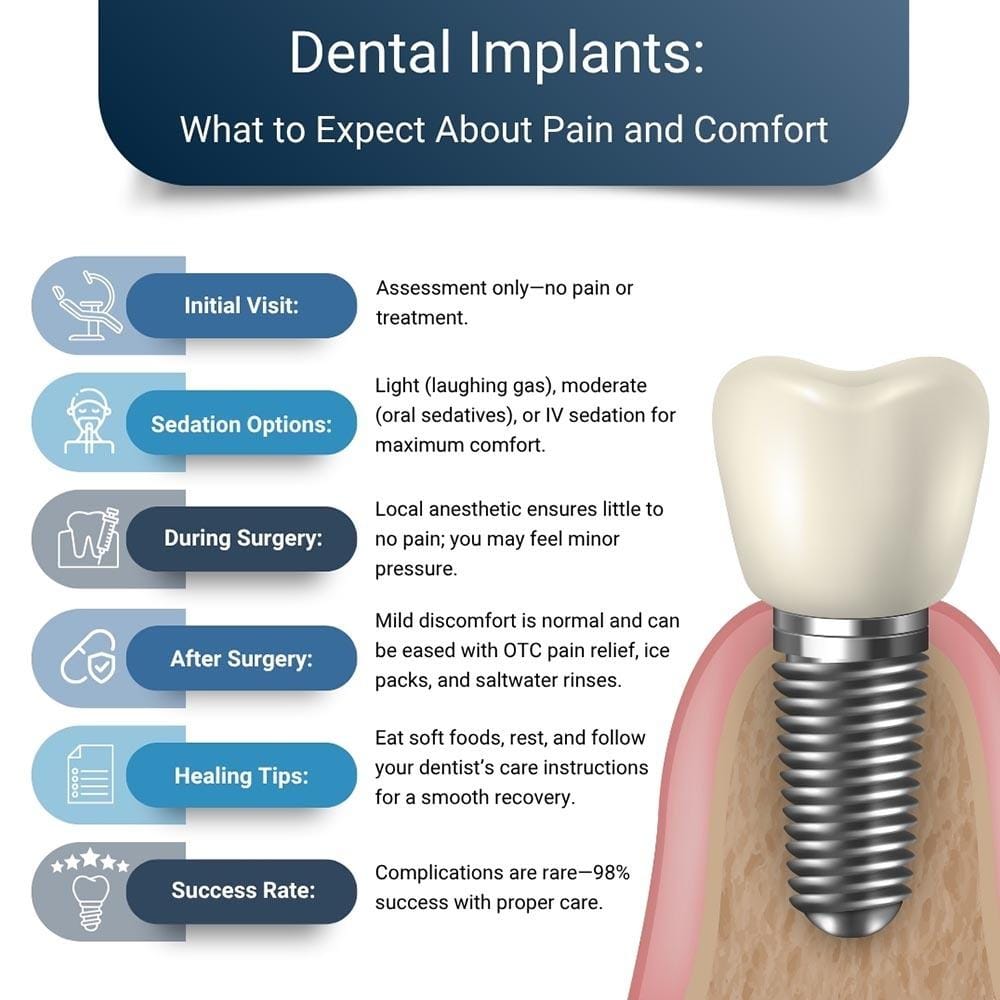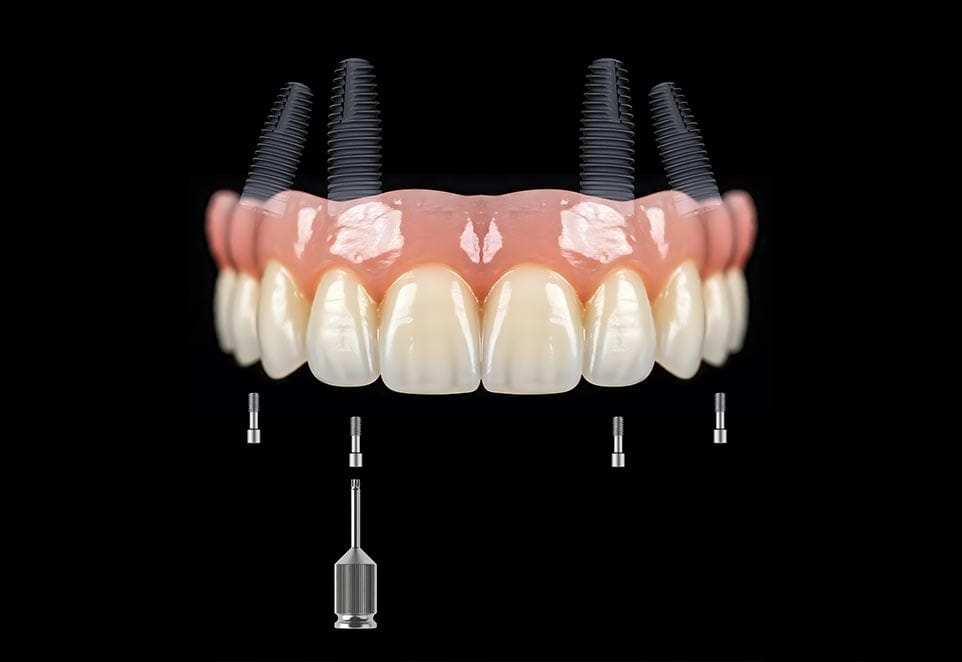Read on to learn more about what to expect during and after your dental implant treatment. Discover how options like sedation dentistry can help to provide a more comfortable and relaxing experience.
What Happens During Dental Implant Treatment?
You will need several appointments with your dental implant dentist over a few months. Below is a brief outline of what to expect during each visit, but remember that your treatment will likely be slightly different since it will be customized for your unique oral health needs.

Initial Visit
No treatment is provided during your initial visit, which is merely to assess your oral and medical health and ensure you are a suitable candidate for dental implant surgery.
Although most people are suitable for implants, it’s important to check that nothing in your oral or medical history could affect the treatment outcome. Possible obstacles include smoking or having a condition that affects your immune system and which could delay healing.
However, every case is assessed individually, so for example, if you have diabetes and it is well-controlled, you are most likely able to have dental implants.
If you decide to proceed with treatment, you will need diagnostic tests. These may be completed during your initial visit or at a later date.
These tests include digital dental X-rays and a cone beam CT scan. Your implant dentist may also wish to take dental impressions and digital photos to plan your treatment thoroughly.
Treatment Planning
You don’t need to be present for treatment planning, which is completed using your diagnostic tests. During the planning stage, your dentist assesses your jawbone’s condition, ensuring plenty of strong and healthy bone for implants.
At this stage, your implant dentist will decide if you need other treatments like bone grafting to build up areas of bone where it is deficient or if you have teeth that are failing and need removing. Sometimes, these treatments can be carried out simultaneously as implant insertion. Other times, they must be completed beforehand and left to heal.
Once the treatment plan is complete, your implant dentist can discuss it with you thoroughly, outlining all possible options. After you have made your choice, a computer-generated surgical stent is created. It replicates your treatment plan and is used during surgery to ensure a more comfortable experience.
Sedation Dentistry
Dentists know that many people dislike going to the dentist, but some have deep-seated fears and anxieties that have prevented them from receiving treatment. Sedation dentistry can help enormously in these situations. The level of sedation provided can be tailored to meet your needs.
Many dentists offer several levels of sedation, ranging from light to moderate sedation, while intravenous sedation provides a deeper level of relaxation and comfort.
If you opt for sedation dentistry, then it can be provided before the local anesthetic is used to numb your mouth, which can be useful if you have a fear of needles.
Light Sedation
Light sedation can include Nitrous oxide or laughing gas, an option many people are already familiar with and which quickly takes effect. After inhaling the gas through a small nose mask, you feel much more relaxed, calmer, and possibly euphoric, giving you a more pleasant experience in the dental chair.
You continue to inhale the Nitrous oxide throughout your treatment until it is complete. Once complete, your dentist may provide pure oxygen to help eliminate the gas from your body more quickly. You will soon feel back to normal.
Moderate Sedation
Moderate sedation can provide a deeper sense of calm, often using an oral sedative that you take an hour or so before your appointment. It will have taken full effect by the time you sit in the dental chair. Your dentist may enhance the effect by combining oral sedation with Nitrous oxide.
Intravenous Sedation
With this option, the sedative is given intravenously through your arm or hand and induces such a deep sense of calm that you will feel sleepy or even fall asleep. Even so, your dentist can wake you easily if they need to check that you are okay or ask a question. Afterward, it may seem like mere minutes have passed, and you will likely remember nothing or very little about the procedure.
IV sedation is a useful option if you require longer or more complex treatment, such as full arch dental implants.
Implant Insertion
Dental implant insertion will take a bit longer than other treatments, but a single implant can typically be completed in an hour or less. Your implant dentist will ensure your mouth is properly numbed before they begin.
Once your mouth is numb, the surgical stent or template is fitted over your gum so your implant dentist knows exactly where to make a small incision. The incision exposes the bone underneath so they can create a tiny hole accurately. The next stage is to insert the dental implant. You may feel slight pressure or tension when they insert the implant and torque or tighten it into place.
After the implant is in place, your gum is stitched back into position, and you are ready to begin healing. At this point, you may receive temporary teeth that could be attached to the implant soon after surgery. Alternatively, your dentist can provide other temporary teeth to wear during healing.
The implants mustn’t be disturbed during healing, so any temporary teeth are merely for cosmetic purposes.
Healing
After the anesthetic wears off, you may feel some mild discomfort. Usually, this can be controlled with over-the-counter pain relief; otherwise, your dentist may prescribe something stronger, for example, if you have received multiple dental implants.
You may feel little or no discomfort if you only received a single dental implant. This is not unusual. Tips to reduce any discomfort at home include:
- Use an ice pack applied to the outside of your mouth to reduce any swelling. Be sure to wrap it in a towel before using it.
- Make your own saltwater rinse by dissolving a little table salt in some warm water. Rinse very gently around your mouth, as this will help keep it clean and aid healing.
- Get plenty of rest, especially if you have had several dental implants, and avoid any strenuous exercise until your implant dentist advises you that it is safe to resume everyday activities.
- If your gums feel sore, make a soothing smoothie or enjoy an ice cream or yogurt to help soothe them.
Avoiding Discomfort during Healing
Before your implant surgery, your implant dentist will discuss what to expect afterward and how to look after the surgery site. They may prescribe antibiotics or suggest using an antimicrobial mouthwash to help keep the surgery site clean and free from infection. Try to follow their advice as closely as possible, as it will help you heal more comfortably and smoothly.
You will also receive extensive instructions on what to eat during healing, as you must avoid chewing on the implant site. If you received multiple implants, you will probably need to follow a soft diet, choosing foods that require minimal or no chewing while the implants heal and fuse with your jawbone.
There is no need to worry, as your implant dentist can give you a comprehensive list of foods to choose from so you can stock up before your implant surgery.
Implant Restoration
Your implants must heal, and it can take anywhere from 2 to 6 months before you return to your dentist for your final implant teeth. Unless the implant needs to be uncovered, you will not need any anesthetic, as your implant dentist will merely need to take a dental impression.
It generally takes at least two weeks to make your new implant teeth which will be fitted on your next visit, completing your treatment. Your implant dentist or hygienist can discuss how to keep your implant teeth clean.
Cleaning dental implant teeth is simple, but you must diligently follow a good daily oral care routine. Properly looking after them is very important to ensure you don’t develop any infections in the future.
Complications Are Rare
Dental implant surgery has a very high success rate. Experienced dental implant dentists can have success rates as high as 98% because they assess people carefully before recommending this treatment and use the latest technologies to plan and place implants.
However, if you are concerned about your implant or experience increased discomfort during healing, don’t hesitate to contact your implant dentist. Although rare, infections can happen occasionally, especially if oral care has been a bit lax. The sooner you seek professional dental care, the sooner you can get rid of the discomfort and protect and preserve your implant.
Dental implants at Clock Tower Dental are a great option for restoring missing teeth, offering a long-term solution, and providing teeth that look natural and have excellent biting and chewing strength. You can rest assured that treatment won’t feel painful and should provide results you will be enjoying for years or even for life.

